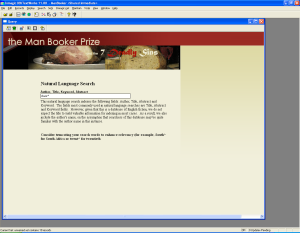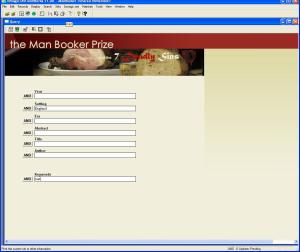The following is an excerpt from the user manual for a textbase L. and I made our first semester in library school. It was written tongue-in-cheek, so please read it as such.
Man Booker and the Seven Deadly Sins:
a meta-analysis of the themes of Man Booker award-winning novels, as viewed
through the lens of the Seven Deadly Sins
The Man Booker Prize is awarded annually to a citizen of the Commonwealth of Nations or the Republic of Ireland for a work of fiction. Established in 1968, it is the most prestigious English-language literary award. Even novels that did not win but were considered (“shortlisted”) become successful.
This textbase is intended to be used by university students of English literature. Who else would be more in need of the ability to search Man Booker Prize winners, than English majors? Possible research themes in our textbase include comparing authors’ country of residency with the setting of their books; demographic changes in prize winners (e.g. country of residence); changes in literary themes and writing styles over the years. From serious students researching current English-language fiction, to ambitious students dreaming of becoming the next Margaret Atwood, our textbase has useful information for English majors.
We noticed a lot of negative themes like revenge, murder and extramarital affairs. This is true of great literature the world over – Anna Karenina, Quo Vadis, The Odyssey, East of Eden…the most ecumenical experience is suffering. Dark-themed literature tends to speak to more people than stories of happy families and well-adjusted individuals. The Seven Deadly Sins presented us with a ready-made set of keywords. We went through the records and assigned books to their applicable sins.
Some stories did have happier themes, like triumphing over adversity or acceptance of one’s life. Drawing from the Catholic tradition of Seven Contrary Virtues (which contrast directly with the Seven Deadly Sins), we added applicable virtues in order to recognize the few positive themes in this collection. There are also larger plot arcs identified (e.g. politics, family discord, loss), providing a meta-analysis of the sort of fiction that has won the Man Booker Prize. The identified sins, virtues and plot arcs make up the controlled vocabulary for this textbase and can be found in the thesaurus at the end of this manual. We have provided both basic and advanced search options.
…
Sample natural language search:
Sample advanced controlled language search:
…
Our colour scheme adds character without straining the eyes. The modern font used for “Man Booker” was chosen to complement the modern logo of the Prize, while the calligraphic font used for “and the 7 Deadly Sins” was chosen because it looked dark and evil. Since our textbase is, by nature, very textual, we thought having a visual of one of the deadly sins was appropriate and added a nice ambience to the main menu.
Since we feel that separate textbases for author information versus book information would be useful for relational searches of overarching themes, we intentionally “left the door open” for a later inclusion of this feature.


